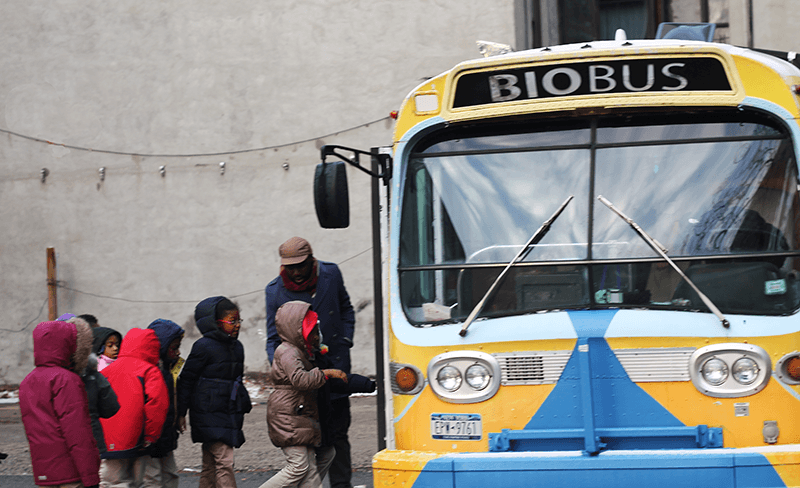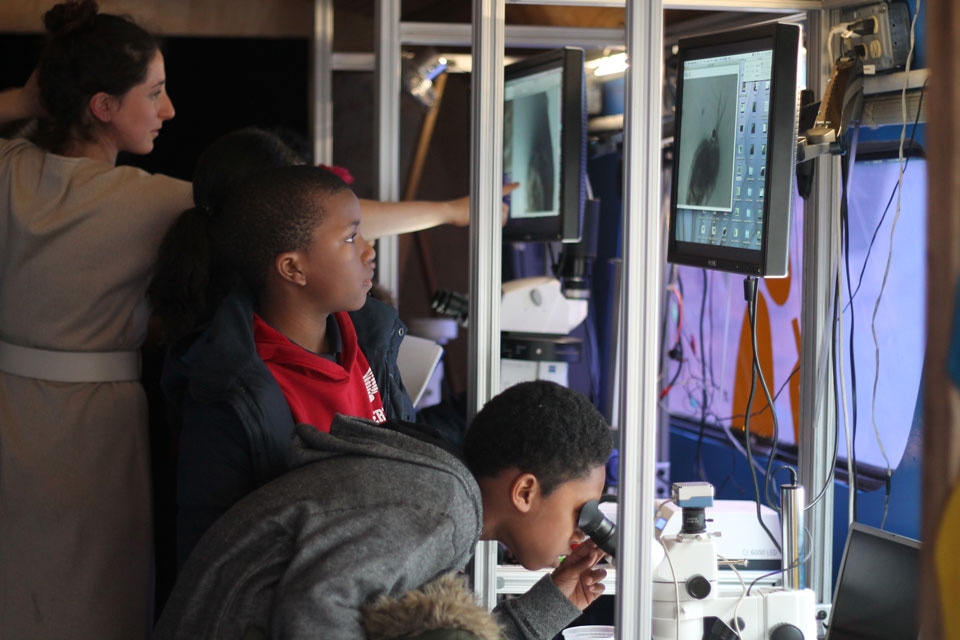Mobile science lab aimed at increasing access to science in underserved populations
Olympus is proud to support the BioBus program, two mobile science laboratories that operate with a mission “to help minority, female, and low-income K–12 and college students in New York City discover, explore, and pursue science.”

The mobile labs, equipped with Olympus microscopes, various specimens and artifacts, and staffed by scientists, visit pre-K through 12th -grade classes for inquiry-based, hands-on, standards-aligned lab sessions. These targeted interventions nurture interest and foster science identity in underserved populations where science achievement gaps are large. BioBus has reached a quarter-million students in the past decade and plans to reach another 750,000 in the next ten years.
Olympus is dedicated to helping people lead more fulfilling lives, and we believe that starts with instilling a desire for knowledge in today’s youth through the power of science. We want to be a partner in discovery, and BioBus is the perfect opportunity to do so. It has been a privilege to see the program grow and reach so many young people over the past decade.”
David Rideout, Executive Director of Marketing, Life Science, Scientific Solutions Group, Olympus Corporation of the Americas
The BioBus method combines hands-on activity, discussion, group work, and problem-solving known to promote the development of a student’s science identity through a constructivist approach to science teaching and learning.
Most of the students we work with are interested in science and excited for science but don't have the opportunity to practice it. BioBus gives students the opportunity to experiment, ask questions, and work with scientists who help them answer these questions. We give students the chance to pursue the desire that they already have inside of them. We're in a Golden Age of science. More people than ever now have the chance to go to grad school, study science, and do research. Those same people are realizing that it needs to be even broader,” said Dubin-Thaler. “Access to science needs to go beyond where it is today. We have a big role to play in providing access to science education and science tools.”
Ben DubinThaler, Ph.D., BioBus Founder and Executive Director
Additional BioBus programs include:
Eight- to twelve-week BioBus “Explore” programs are offered at schools and community centers to provide students with advanced science lab courses unavailable to them otherwise. BioBus scientists also build site staff's capacity to run inquiry-based research programs, as well as help equip sites with hardware and supplies.

BioBus “Pursue” programs further support tomorrow’s scientific leaders through paid internships for high school and college students. BioBus interns develop an independent science research project, receive mentorship from professional scientists, and themselves serve as mentors to younger students through teaching.
Many BioBus "Explore" and “Pursue” programs are located at BioBase Harlem at Columbia University's Zuckerman Institute. At this community lab, students work side-by-side with BioBus scientists and use the same advanced research microscopes found aboard the mobile labs and in the neuroscience research labs in the Zuckerman Institute. Several of our students have already gone on to internships in Zuckerman Institute labs.
BioBus by the Numbers:
- 250,000 students have participated in BioBus educational offerings, with 750,000 more planned over the next decade
- 5% of the students who board a mobile lab sign up for an Explore program
- 73% of our Explore students had never taken part in science outside of school before
- 80% of staff are from groups underrepresented in STEM fields
- 84% of teachers rate the BioBus as "equally," "more," or "much more" valuable to their students as compared to a visit to the American Museum of Natural History, the New York Hall of Science, or the Liberty Science Center
To celebrate the collaboration, Olympus created a video and dedicated website in conjunction with their campaign dedicated to exploring the world through microscopy—Your Science Matters™. View the video on YouTube here. The website will be updated with additional videos and customer testimonials.